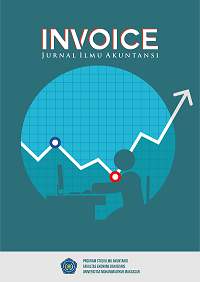The Effect of Implementation of Government Accounting Standards and Internal Control System on The Quality of Financial Statements of Disdukcatpil District Langkat
DOI:
https://doi.org/10.26618/inv.v4i2.8991Abstract
In the context of accountability, it is necessary to implement an appropriate, clear and measurable financial reporting system in accordance with the principles of transparency and accountability. With the financial reports, both central and regional finances are expected to be managed properly in order to manage public funds in a transparent, economical, efficient, effective and accountable manner. The existence of these financial statements needs to be considered further, the usefulness of the report as a mere obligation without using the financial statements as a source of information to determine and take policies in developing and growing the region. This study uses a method, namely a quantitative approach. This research begins with observations as preparation for the final stage, namely reporting the results of the study. The research time starts from January 17, 2022 until it is finished. This research was conducted directly on the company. The type of data used is Primary data. Primary data is taken from direct observation and then conducting interviews with related parties. The data used are data from interviews. The selected population are employees of DISDUKCATPIL. The results of this study are the effect that occurs between the Government Accounting System and the Financial Statement Quality variable is not statistically significant at the 5% significance level. The effect that occurs between the Government Internal Control System and the Financial Statement Quality variable is statistically significant at the 5% significance level. The Government Accounting System and the Government Internal Control System simultaneously or simultaneously affect the Financial Report Quality variable at a significance level of 5%.References
Emka, B. (2006). Auditing Pedoman Pemeriksaaan Akuntansi. STIE Inaba.
Harmono. (2009). Manajemen Keuangan Berbasis Balanced Scorecard Pendekatan Teori, Kasus dan Riset Bisnis. Bumi Aksara.
Muhammad. (2016). Manajemen Pembiayaan Bank Syariah. UPP STIM YKPN.
Murhadi, W. R. (2013). Analisis Laporan Keuangan Proyeksi dan Valuasi Saham. Salemba Empat.
Marsuni, N. S. (2019). PENGARUH PRAKTIK ISLAMIC CORPORATE SOCIAL RESPONSIBILTY (I-CSR) TERHADAP KINERJA KEUANGAN PADA BANK UMUM SYARIAH PERIODE 2014-2018.
Marsuni, N. S., & Rismawati, R. (2018). INCOME AND COST ANALYSIS OF BUSINESS ACTIVITIES DEVELOPMENT AT THE BUSINESS DEVELOPMENT CENTER (P2B) STATE ISLAMIC UNIVERSITY OF MAKASSAR. Jurnal Ekonomi Balance, 14(1), 129-136.Pohan, A. (2008). Kerangka Kebijakan Moneter dan Implementasinya di Indonesia. PT. Raja Grafindo Persada.
Siregar, Y. P. (2020). KINERJA DINAS KEPENDUDUKAN DAN PENCATATAN SIPIL DALAM PELAYANAN PUBLIK DI KABUPATEN LANGKAT. Universitas Sumatera Utara.
Soemitra, A. (2017). Bank dan Lembaga Keuangan Syariah. Kencana.
Sulhan dan Elly Siswanto. (2008). Manajemen Bank Konvensional dan Syariah. UIN Malang Press.
Downloads
Published
Issue
Section
License
Authors who publish with Invoice: Jurnal Ilmu Akuntansi agree to the following terms:
Copyright Ownership
The copyright of all articles published in this journal remains with the author(s). However, the authors grant Invoice: Jurnal Ilmu Akuntansi the right of first publication with the work simultaneously licensed under a Creative Commons Attribution 4.0 International License (CC BY 4.0). This license allows others to share, copy, redistribute, adapt, and build upon the work for any purpose, even commercially, as long as proper credit is given to the original author(s) and the source.Licensing and Access
Invoice: Jurnal Ilmu Akuntansi provides immediate open access to its content on the principle that making research freely available to the public supports a greater global exchange of knowledge. All published materials are available freely without subscription or payment and can be accessed, downloaded, and reused by any user provided that appropriate attribution is given.Permission for Reuse
For uses not covered by the CC BY 4.0 license, such as commercial reprints, translations, or any form of adaptation without clear attribution, users must obtain written permission from the editorial team. Requests for such permissions can be directed to the editorial office at: [insert journal email here].Plagiarism and Originality
Authors are responsible for the originality of their submissions. All articles are screened for plagiarism using appropriate tools before acceptance. Manuscripts found to contain unoriginal content or infringing materials will be rejected or retracted as per journal policy.

